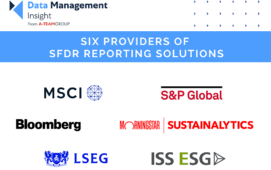If firms weren’t apprised of the importance of corporate actions data before, a recent action by the Securities and Exchange Commission (SEC) against Bank of America should convince them. Following a few months of trawling through corporate actions related data, the regulator has announced that it is seeking to charge Bank of America with failing to disclose extraordinary financial losses at Merrill Lynch prior to a shareholder vote to approve a merger between the two companies.
In order to come to this conclusion the SEC examined reams of documentation and data related to the merger: “tens of thousands of pages of records, including email and other electronic communications”. SEC staff also took testimony or conducted investigative interviews of dozens of witnesses, including senior executives, internal counsel, and external counsel of both Bank of America and Merrill Lynch.
This work resulted in the regulator issuing a request to the US District Court for the Southern District of New York for permission to amend its pending complaint against Bank of America to include the new charges. The agency earlier charged the bank with misleading investors about billions of dollars in bonuses that were being paid to Merrill executives. That complaint was amended in October to add a charge for Bank of America’s failure to comply with certain affirmative disclosure obligations under the federal proxy rules.
Bank of America has waived all claims of privilege relating to the proxy disclosures made in connection with the merger and several other subjects in order to permit the SEC to conduct a thorough investigation of these subjects, including the actions, advice and communications of counsel.
The SEC’s proposed second amended complaint alleges that Bank of America learned, prior to the 5 December 2008 shareholder meeting vote, that Merrill Lynch experienced a net loss of US$4.5 billion in October and estimated that it had experienced billions of dollars of additional losses in November. The actual and estimated losses together represented approximately one third of the value of the merger at the time of the shareholder meeting and more than 60% of the aggregate losses Merrill Lynch sustained in the preceding three quarters combined.
The SEC’s proposed second amended complaint, which the court made public this week, alleges that Merrill’s slumping performance represented a fundamental change to the financial information that Bank of America provided shareholders in a 3 November 2008 proxy statement to solicit their votes for approval of the Merrill Lynch merger on terms that had principally been negotiated in September 2008. In connection with the merger, Bank of America also publicly filed a registration statement in which it represented that it would update shareholders about any fundamental changes in the information previously disclosed.
The SEC’s proposed complaint would allege that Bank of America “erroneously and negligently concluded that no disclosure concerning these extraordinary losses was required as shareholders were called upon to vote on the proposed merger with Merrill Lynch”. The SEC also alleges that the lack of any disclosure about the losses deprived shareholders of up to date information that was essential to their ability fairly to evaluate whether to approve the merger on the terms presented to them. According to the proposed complaint, Bank of America’s failure to disclose this information violated its undertaking to update shareholders concerning fundamental changes to previously disclosed information, and rendered its prior disclosures “materially false and misleading”.
According to the SEC’s proposed complaint, Bank of America executives at various times discussed the firm’s disclosure obligations with internal and external counsel. These executives are not alleged to have deliberately concealed information from counsel or otherwise acted with intent to mislead. Nor is any counsel alleged to have acted with intent to mislead. For these reasons, the SEC’s proposed complaint does not seek charges against any individual officers, directors or attorneys. SEC staff has advised the Commission that, after a careful assessment of the evidence and all of the relevant circumstances, it has determined that charges against individuals for their roles in connection with proxy disclosure are not appropriate.
The SEC’s proposed second amended complaint adds an allegation that Bank of America has violated Section 14(a) of the Securities Exchange Act of 1934 and SEC Rule 14a-9 by failing to make any disclosure to its shareholders of the losses that Merrill Lynch incurred in the two month period leading to the 5 December 2008 shareholder vote.
As well as the pending decision regarding punitive action towards Bank of America, the upshot of all of this scrutiny will be to once again highlight the issue of timeliness and accuracy of corporate actions data. Although the alleged failings have not been directly related to a failure in systems or technology, it does throw the potential risk faced by those that fail in their shareholder duty to provide corporate actions data in a timely manner into the spotlight.
Subscribe to our newsletter





